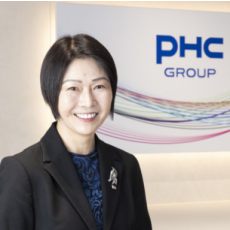PHC Group is a global collection of healthcare companies specializing in precision technology, including medical devices, healthcare IT, and life sciences, with a focus on innovative solutions to support diagnostics, cancer treatment development, and cell and gene therapy research.
Last year, in your first year as CEO of PHC Group, you were named one of the Top 50 Women Leaders in Healthcare Technology by The Healthcare Technology Report. Could you share your thoughts on what led to this recognition?
I was truly humbled by this award. However, what means more to me is that PHC Group was ranked number six on the list of Top 100 Healthcare Technology Companies. This speaks volumes about our 55 years of experience, our precision technology for healthcare, and our global reach. It is not just my first year as CEO that led to where we are now, but the strength of the company and the hard work of our dedicated team.
What would you consider the main highlights of your first year leading PHC Group?
Our vision at PHC Group is to power the future of healthcare through precision technology. We have successfully launched several innovative products across our global companies – like Eversense 365, the first implantable continuous glucose monitoring (CGM) system for people with diabetes that monitors glucose continuously for up to 365 days and is now cleared for use in the U.S. We also introduced LiCellMo, a live cell metabolic analyzer, which we expect will play a significant role in cancer and cell gene therapy research.
Financially, we have turned a corner after a few challenging years after COVID-19, with stronger results for FY 2024 so far, positioning us for future growth. Moreover, we have set a new direction for the company with a clearer focus on life sciences, particularly supporting cancer diagnostics and cell and gene therapy. We have also set a new vision and reaffirmed our core values, which guide our daily operations and drive synergy across all business units.
What factors contributed to the financial challenges since 2022, and what changes have led to recent improvements?
The COVID-19 pandemic played a role. One of our businesses makes ultra-low temperature freezers, which were used to store vaccines, and we also had a significant testing business. These areas experienced a drop in COVID-related demand. In diabetes management, the market is going through a shift from blood glucose monitoring (BGM), where we are very strong, to continuous glucose monitoring (CGM). The changing market has impacted our sales.
We have been anticipating market shifts and preparing accordingly. The market for BGM may be shrinking, but we have made regional adjustments to control the impact. We have been investing in life sciences, such as a new product from PHCbi to support cell and gene therapy research and a new digital slide scanner from Epredia to aid laboratories in cancer diagnostics, to ensure we are positioned for future growth. These investments are now starting to bear fruit, and we are seeing positive momentum. Projects we have been working on for years are now positioned to take off. That’s the turning point.
Can you elaborate on how PHC Group is increasing its focus towards life sciences and diagnostics?
Going forward, we will focus more on cell and gene therapy, particularly related to cancer. We are building on our business in biomedical research equipment, such as ultra-low temperature freezers and incubators, to invest further into life sciences, particularly supporting cancer diagnostics and treatment development. This includes launching products that may improve efficiencies in cancer therapy development by streamlining workflow and reducing costs, and by launching products that support laboratory automation and digitization.
PHC Group will build on our existing technology by identifying where we can add value with precision manufacturing. There will always be a need for basic instruments required in research and clinical settings, which we provide. As cancer diagnostics becomes more complex, more customized, and more costly, we plan to build on our core technologies and existing infrastructure to offer more specialized solutions in life sciences. For example, our focus on cancer diagnostics can support pharmaceutical companies in developing new cancer treatments. In the therapy manufacturing process there can be a lot of waste, which is where we come in to improve the workflow and increase efficiency in drug development, leveraging our precision technology to enhance the development of innovative, life-saving solutions.
Will acquisitions play a major role in your growth strategy?
Our growth strategy will involve a combination of acquisitions, partnerships, and joint research programs. While we are open to exploring acquisitions, we also believe in the power of collaboration and strategic partnerships.
Acquisitions will continue to be part of PHC Group’s strategy, but we are focused on ensuring each investment aligns with our long-term goals. We will carefully assess the returns on these investments, as evidenced by our strong focus on return on invested capital. Our goal is to grow systematically, expanding into new areas while ensuring we deliver precision technology for healthcare at each step.
What is your approach to tackling challenges in cell manufacturing, especially considering the high costs and inefficiencies involved?
We view challenges as opportunities, particularly in areas like cell and gene therapy manufacturing, where there are significant hurdles in efficiency and cost. Our approach is to assess industry needs and identify specific areas where our precision technology manufacturing can make an impact.
For instance, in the collaboration between Cyfuse Biomedical and our subsidiary PHC Corporation, we focus on identifying and addressing specific needs in their manufacturing process, such as improving the speed and yield of cell production. Our customized solution for that partnership can help streamline the process, reducing labor time and increasing productivity.
We are developing custom equipment that will automate key aspects of cell culture growth and measurement, addressing challenges like nutrient balance and culture changes, which are currently done manually. While we do not aim to fix everything at once, we focus on specific, targeted improvements where our technology can make a real difference, especially in high-cost areas like cell and gene therapy development.
What role do you expect the Eversense® 365 CGM product to play in the glucose monitoring market?
Eversense® 365 is designed to serve people with Type 1 and Type 2 diabetes age 18 and over who need continuous glucose monitoring, including those using insulin pumps. The product offers a level of convenience that traditional BGM methods and other traditional CGMs on the market cannot match.
While the market for glucose monitoring devices is competitive, the convenience of an implantable device that continuously monitors glucose for an entire year is a significant game-changer. Although adoption may take time as people adjust to new technology, the double-digit growth we have seen since the product’s launch indicates strong potential for broader market penetration, especially among early adopters who value both convenience and accuracy.
Where do you hope to take the company in the next three years?
In three years, I hope PHC Group will be known for its strong position in life sciences, particularly in supporting cancer diagnostics and cancer treatment development. We aim to become an even more vital player in delivering innovative solutions to the healthcare industry, particularly for cancer, while not manufacturing medicines ourselves.
We are focusing on improving efficiencies across our global operations, emphasizing synergy across our business units. This will ensure that we are optimizing resources and maximizing the value we deliver to our customers. By prioritizing investments in life sciences, particularly cancer diagnostics, we aim to solidify our position as a leader in this space.





